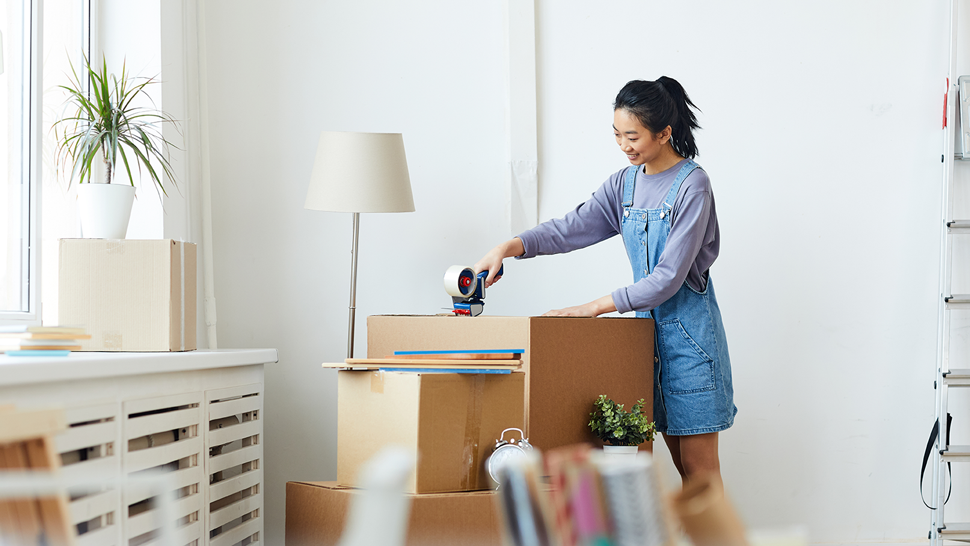
Sun Apr 06 - Written by: Denis Maina
13 Surprising Benefits of Decluttering Your Home
Living with clutter can feel overwhelming and stressful. Those piles of stuff in your closets, drawers and garage aren't just taking up physical space – they're probably weighing on your mind too. But getting rid of excess stuff does more than just free up room in your home.
You might be surprised to learn that decluttering can transform multiple areas of your life. From better sleep and reduced anxiety to increased productivity and even saving money, clearing out the chaos brings unexpected perks that go way beyond a tidy space. Once you understand these hidden benefits, you’ll wonder why you didn’t start decluttering sooner.
Let’s look at 13 amazing ways that decluttering your home can make your life better – and they’re not what you’d expect. These science-backed benefits will give you the motivation you need to finally tackle those overflowing spaces.
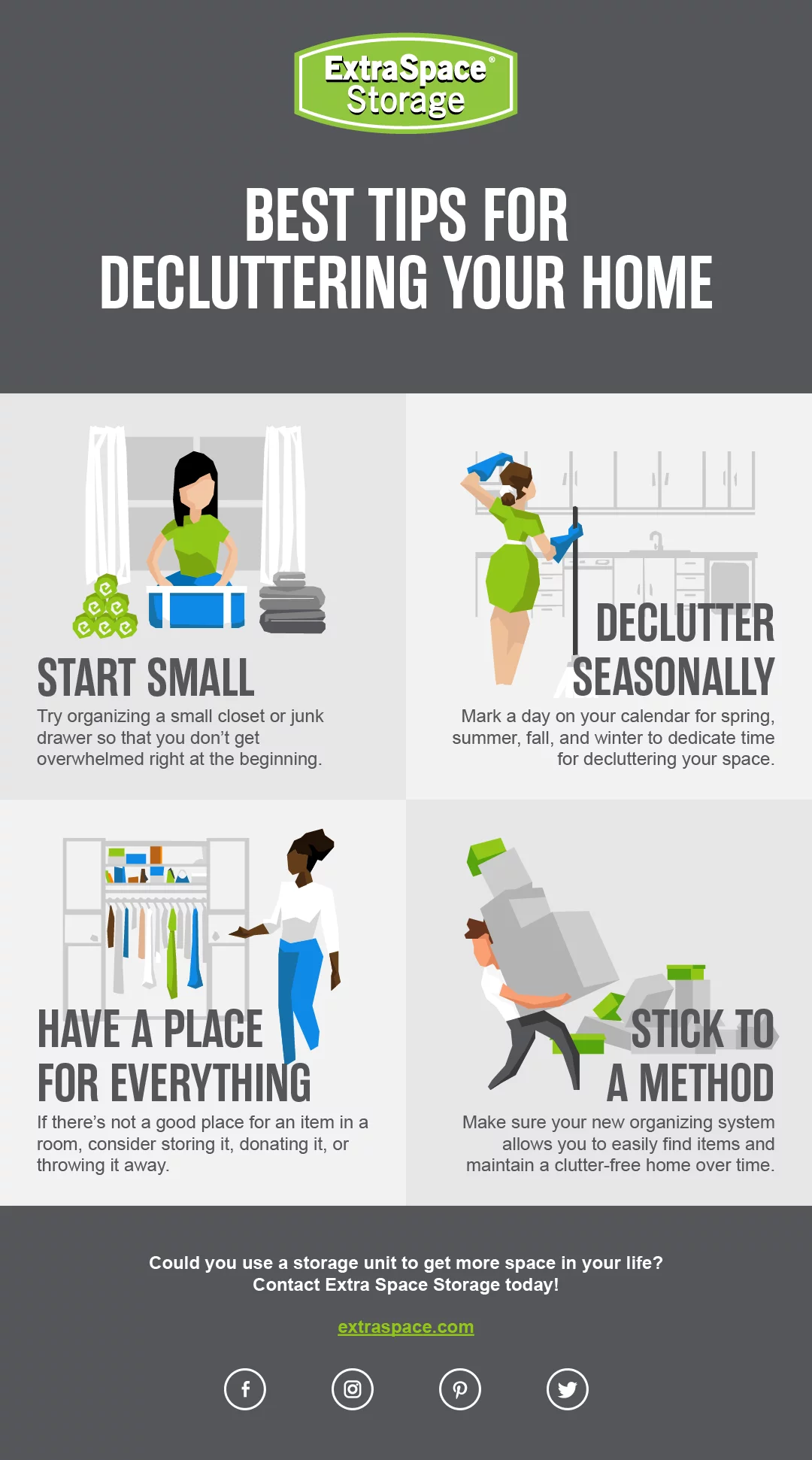 Organized decluttering process with sorting bins for effective home organization. Source: Extra Space Storage
Organized decluttering process with sorting bins for effective home organization. Source: Extra Space Storage
Understanding the Art of Decluttering Your Living Space
Decluttering isn’t just about tossing things away. It’s a mindful process that requires you to evaluate each item’s purpose in your life. Start by sorting items into three basic categories:
- Keep needed essentials
- Use daily items like kitchen tools
- Discard unused items donate gently-used belongings
Remember to tackle one space at a time to avoid feeling overwhelmed.
You’ll find this systematic approach makes the decluttering process more manageable and sustainable. Focus on creating clear spaces rather than perfect ones to maintain momentum throughout your decluttering journey.
Boosting Mental Clarity and Emotional Well-Being
Living in a clutter-free environment creates mental space that allows your mind to thrive and process information more effectively.
:max_bytes(150000):strip_icc()/decluttering-our-house-to-cleanse-our-minds-5101511_final1-52c069e7a52046209468e9ddd1558f43.png) A clutter-free environment promotes mental clarity and reduces stress. Source: Verywell Mind
A clutter-free environment promotes mental clarity and reduces stress. Source: Verywell Mind
Reducing Anxiety and Stress Levels
Research shows that cluttered spaces trigger the release of cortisol (the stress hormone) in your brain. When you declutter your home you’ll notice an immediate reduction in visual distractions that contribute to daily anxiety. A study by UCLA’s Center on Everyday Lives of Families found that women who described their homes as cluttered had higher levels of stress hormones throughout the day. By clearing out excess items you create a calm sanctuary that helps regulate your nervous system. Physical clutter bombards your mind with excessive stimuli forcing your senses to work overtime to process unnecessary information. Removing this visual noise lets your brain relax and reset naturally.
Improving Focus and Decision-Making
A tidy space leads to clearer thinking patterns and better decision-making abilities. Princeton University researchers discovered that physical clutter limits your brain’s ability to process information effectively. When your environment is organized you can concentrate better on important tasks without constant visual interruptions. Decluttering also strengthens your decision-making muscles as you evaluate which items truly add value to your life. Each time you decide to keep donate or discard something you’re practicing quick effective decision-making. This skill transfers to other areas of your life helping you make faster more confident choices in work relationships and daily activities.
Enhancing Physical Health Benefits
A clutter-free home doesn’t just look better – it can significantly boost your physical well-being. Here’s how decluttering impacts your health in ways you might not expect.
Decreasing Allergy Symptoms
Decluttering drastically reduces the number of surfaces where dust mites allergens pollen and pet dander can accumulate. When you remove excess items from your home you’ll eliminate countless dust-trapping zones that trigger allergic reactions. Research shows that cluttered spaces contain up to 400% more dust than tidy areas making regular cleaning nearly impossible. By maintaining clear surfaces and minimal belongings you’re creating an environment that’s easier to clean thoroughly. This simple change can lead to fewer allergy symptoms like sneezing congestion and itchy eyes.
Creating a Safer Living Environment
A decluttered space significantly reduces your risk of accidents and injuries at home. Clearing walkways of unnecessary items eliminates common tripping hazards that cause thousands of household accidents each year. You’ll also minimize the risk of falling objects particularly in storage areas where overstacked items can become unstable. Studies by the National Safety Council show that a organized home reduces household accidents by up to 50%. Better organization of essential items like medications and first-aid supplies also means quicker access during emergencies.
Increasing Financial Awareness and Savings
Decluttering your home can significantly impact your financial health in unexpected ways. Here’s how organizing your space can lead to better money management and savings.
 Decluttering can help uncover forgotten items of value and prevent unnecessary future purchases. Source: IG Wealth Management
Decluttering can help uncover forgotten items of value and prevent unnecessary future purchases. Source: IG Wealth Management
Discovering Hidden Valuables
When you sort through your belongings, you’ll likely uncover forgotten items with significant resale value. Old electronics, vintage clothing, collectibles or unused gift cards can bring in extra cash through online marketplaces or consignment shops. A thorough declutter often reveals duplicate items you can sell – like that spare coffee maker from your last move or brand-new tools you never opened. Many people find hundreds of dollars worth of items they can monetize, from designer bags tucked away in closets to rare books gathering dust on shelves. Plus, you might discover lost cash, uncashed checks or misplaced gift cards while organizing drawers and files.
Preventing Unnecessary Purchases
Decluttering helps you take inventory of what you actually own, preventing duplicate purchases and impulse buying. When your home is organized, you’ll easily spot what you have and what you truly need. This awareness naturally reduces spending on items you already own but couldn’t find in the clutter. You’ll develop a clearer understanding of your consumption habits and think twice before bringing new items home. Many people report saving 20-30% on household purchases after decluttering because they’re more mindful of their existing possessions. This newfound awareness also helps you make better shopping decisions based on actual needs rather than momentary desires.
Saving Time on Daily Activities
A clutter-free home transforms your daily routines saving precious hours each week. Here’s how decluttering helps you reclaim your time.
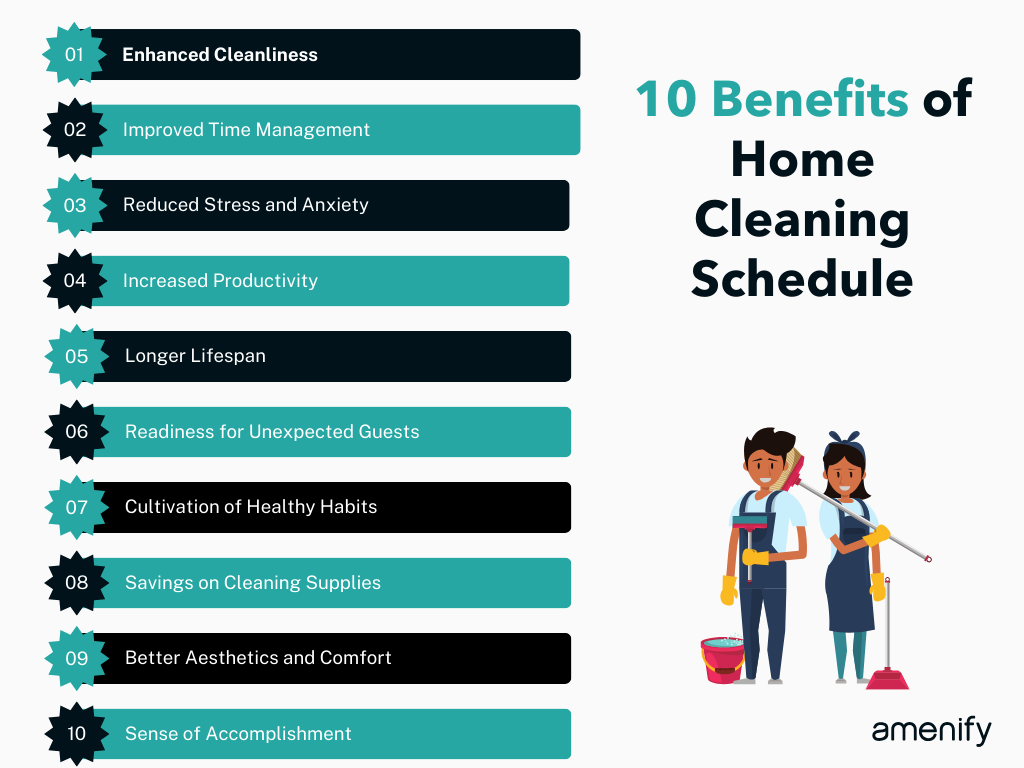 A decluttered space allows for quicker and more efficient cleaning routines. Source: Amenify
A decluttered space allows for quicker and more efficient cleaning routines. Source: Amenify
Streamlining Cleaning Routines
A decluttered space dramatically cuts your cleaning time in half. Without excess items crowding your surfaces you’ll spend less time moving things around to dust or vacuum. Your regular cleaning tasks become faster since there’s less stuff to work around. Studies show that people with organized homes spend 40% less time on routine cleaning compared to those with cluttered spaces.
Think about wiping down kitchen counters or vacuuming floors – these tasks become quick 5-minute jobs instead of 20-minute ordeals. You won’t need to shuffle items around or deal with cleaning hard-to-reach spaces behind stacks of stuff. Plus cleaning supplies stay organized making it easier to grab what you need and get started right away.
Finding Items More Efficiently
Stop wasting time searching for misplaced items in cluttered spaces. Research indicates that the average person spends 2.5 days per year looking for lost items. By maintaining designated spots for your belongings you’ll always know where to find what you need.
Imagine grabbing your keys wallet and phone in seconds instead of frantically searching every morning. You’ll save time getting ready when your clothes are organized and visible in your closet. Essential items like bills documents and tools become instantly accessible when everything has its proper place. This efficiency extends to your digital space too – organized files and folders on your devices mean no more endless scrolling to find what you need.
Improving Sleep Quality and Habits
A decluttered bedroom can significantly impact your sleep quality, helping you achieve more restful nights and energized mornings.
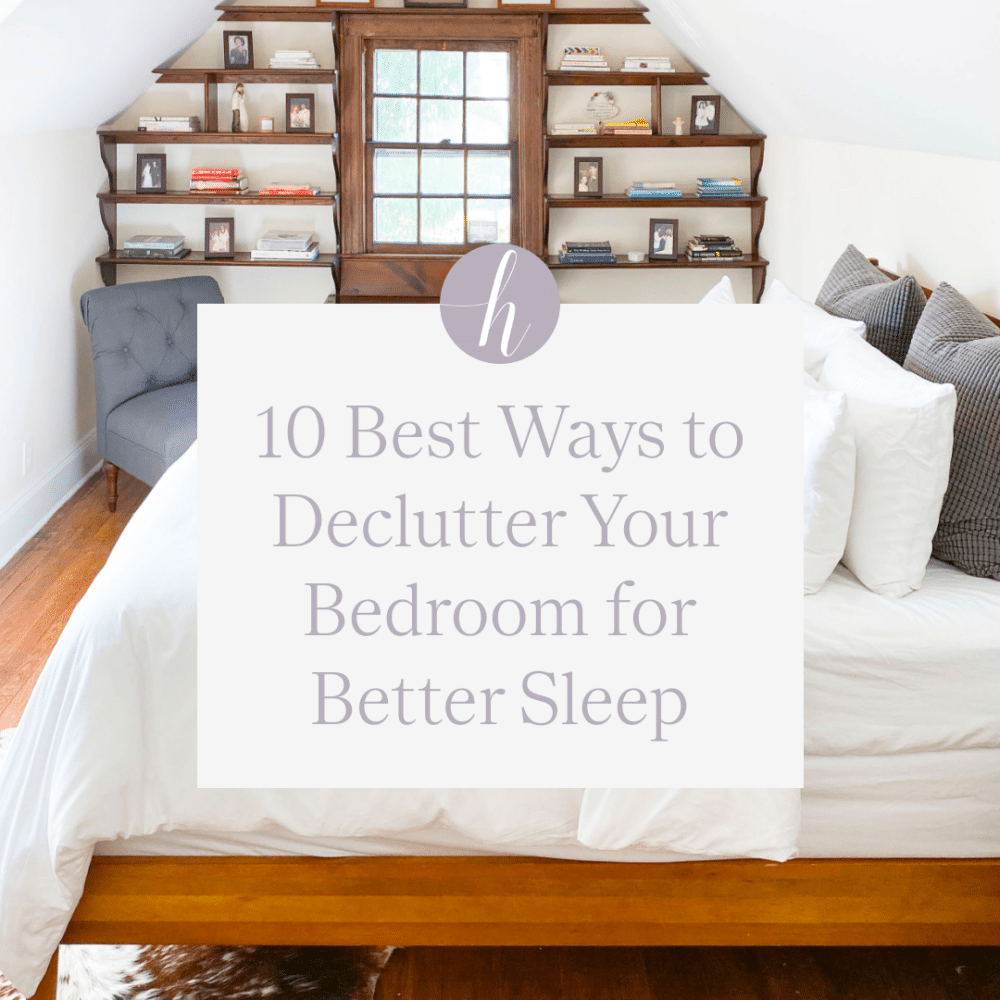 A decluttered bedroom creates a peaceful environment conducive to better sleep quality. Source: Horderly - Professional Organizing
A decluttered bedroom creates a peaceful environment conducive to better sleep quality. Source: Horderly - Professional Organizing
Creating a Peaceful Bedroom Environment
A clutter-free bedroom promotes better sleep by reducing visual stimuli that can trigger stress responses. When you remove excess items from your sleeping space you’ll create a more serene environment that signals your brain it’s time to rest. Research shows that people who sleep in tidy rooms fall asleep 15 minutes faster on average than those with cluttered spaces. Remove unnecessary furniture books electronics and decorative items from your bedroom surfaces. Keep only essential items like a bedside lamp alarm clock and perhaps a book you’re currently reading. This minimalist approach helps maintain lower cortisol levels throughout the night leading to more restorative sleep cycles.
Reducing Night-Time Distractions
Decluttering eliminates common sleep disruptors that can prevent you from getting quality rest. By clearing your bedroom of excess items you’ll reduce the chances of being awakened by falling objects or rustling papers. Store away exercise equipment laundry baskets and work-related materials that might tempt you to engage in activities when you should be winding down. Studies indicate that removing visible reminders of unfinished tasks can reduce bedtime anxiety by 60%. Create designated spots for potentially distracting items outside your bedroom such as phones tablets and work documents. This physical separation helps establish stronger boundaries between your sleep space and active areas reducing the urge to check emails or scroll through social media before bed.
Strengthening Family Relationships
Decluttering can significantly improve your family dynamics by creating a more harmonious living environment. When you remove physical obstacles you also clear the path for stronger emotional connections.
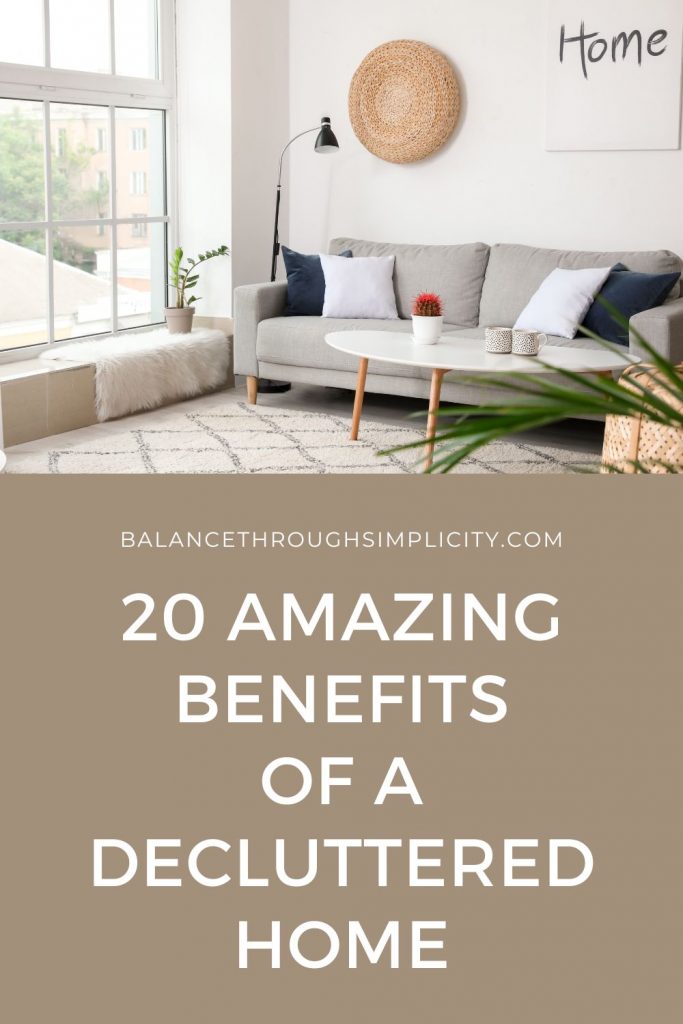 A decluttered home creates more space for meaningful family interactions and connections. Source: Balance Through Simplicity
A decluttered home creates more space for meaningful family interactions and connections. Source: Balance Through Simplicity
Fostering Better Communication
A clutter-free home naturally encourages more family interaction. Without piles of stuff blocking common areas you’ll find more opportunities for meaningful conversations. Research shows families in organized spaces spend 40% more time talking face-to-face compared to those in cluttered homes. When you’re not constantly stressed about mess or searching for missing items you can focus on what really matters – connecting with your loved ones. The simple act of decluttering together also creates natural opportunities to communicate openly about shared goals preferences and boundaries.
Creating Shared Spaces
Removing excess items transforms crowded areas into welcoming gathering spots for your family. You’ll notice family members naturally gravitating toward these cleared spaces to read play games or simply hang out together. A decluttered living room becomes perfect for movie nights while a tidy kitchen invites cooking sessions and shared meals. Studies indicate families who maintain organized common areas spend 60% more quality time together. These clutter-free zones also make it easier to host family activities and create lasting memories without the distraction of surrounding mess.
Boosting Creativity and Productivity
A clutter-free environment can significantly enhance your creative thinking and work efficiency. Research shows that organized spaces boost cognitive performance by up to 30%.
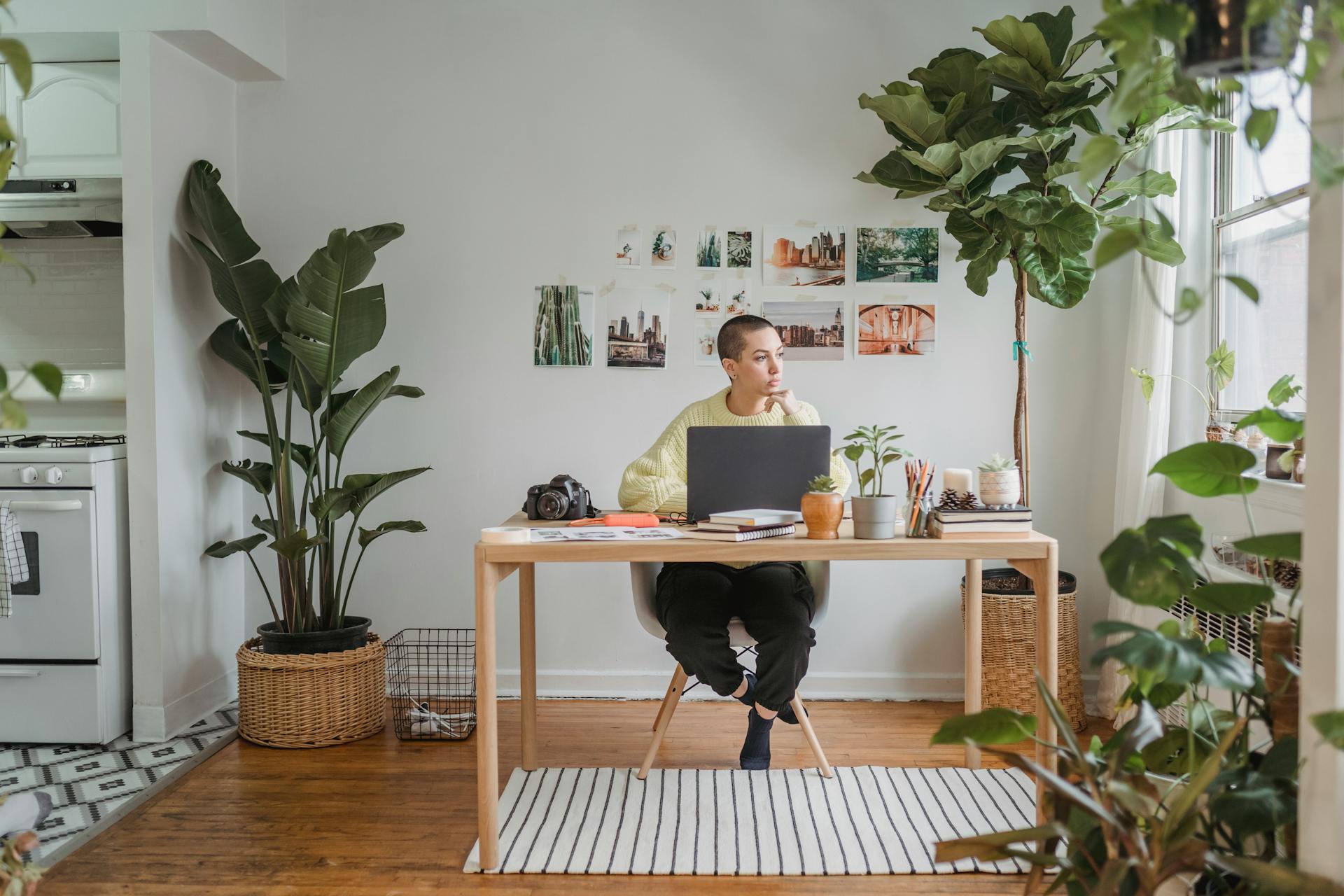 A well-organized, clutter-free workspace can significantly boost creativity and productivity. Source: Calendar App
A well-organized, clutter-free workspace can significantly boost creativity and productivity. Source: Calendar App
Establishing an Efficient Workspace
A decluttered workspace lets you focus on what truly matters. When you clear off your desk your brain processes information 25% faster since it’s not distracted by visual chaos. Studies by Princeton University researchers show that people working in organized spaces complete tasks 35% faster than those in cluttered environments. Simple changes like having a designated spot for your tools files and tech gadgets can save you up to 45 minutes daily in searching time. You’ll also notice improved concentration as your mind isn’t constantly processing unnecessary visual stimuli.
Enhancing Problem-Solving Skills
Decluttering sharpens your decision-making abilities and boosts creative problem-solving. Each time you decide what to keep or discard you’re exercising your critical thinking muscles. Studies from Stanford University reveal that people in organized environments solve complex problems 20% faster than those surrounded by clutter. Your brain can process information more efficiently when it’s not overwhelmed by physical disorder. Plus you’ll develop better organizational strategies that transfer to other areas of your life like project management and time scheduling. These improved problem-solving skills often lead to innovative solutions in both personal and professional scenarios.
Supporting Environmental Sustainability
Decluttering your home isn’t just about creating a more organized space—it’s a powerful way to contribute to environmental conservation. Here’s how your decluttering efforts can help protect our planet:
 Sustainable decluttering through donation extends the lifecycle of items and reduces waste. Source: ClimateSort
Sustainable decluttering through donation extends the lifecycle of items and reduces waste. Source: ClimateSort
Reducing Waste Generation
When you declutter thoughtfully you’ll naturally reduce your environmental impact. Start by sorting items for recycling donation or responsible disposal instead of sending everything to landfills. You can recycle electronics through certified e-waste programs sell gently used items on marketplace apps or donate usable goods to local charities. Studies show that households that regularly declutter reduce their annual waste output by up to 30%. Plus you’ll become more aware of your consumption patterns which leads to generating less waste in the future.
Promoting Mindful Consumption
Decluttering transforms your shopping habits by making you more conscious of what you bring into your home. You’ll start asking yourself important questions like “Do I really need this?” and “Where will I store it?” before making purchases. Research indicates that people who maintain clutter-free spaces make 25% fewer impulse purchases. This mindful approach to consumption helps reduce your carbon footprint since you’ll buy less packaging establish better storage systems and make more sustainable choices. When you do shop you’re more likely to invest in quality items that last longer rather than disposable alternatives.
Building Better Shopping Habits
Decluttering doesn’t just organize your space—it transforms how you shop and consume. Here’s how a clutter-free home helps you develop smarter shopping habits.
 Mindful shopping practices help maintain a clutter-free home by preventing unnecessary acquisitions. Source: Fleurish Collective
Mindful shopping practices help maintain a clutter-free home by preventing unnecessary acquisitions. Source: Fleurish Collective
Making Intentional Purchases
A tidy home makes you more aware of what you already own making it easier to avoid impulse buys. When you’ve invested time in organizing your belongings you’ll think twice before bringing new items home. Research shows that people who maintain organized spaces are 65% less likely to make unnecessary purchases. Before buying something new you’ll naturally ask yourself key questions like “Do I have space for this?” and “Will this add value to my life?” This mindful approach helps you save money and reduces the chances of accumulating clutter again.
Practicing Minimalism
Living with less stuff naturally guides you toward minimalist shopping habits. You’ll start focusing on quality over quantity picking items that serve multiple purposes or bring genuine value to your life. Studies indicate that people who embrace minimalism report spending 40% less on non-essential purchases compared to their previous habits. Instead of buying trendy items you’ll gravitate toward timeless pieces that last longer. This shift not only saves money but also reduces environmental impact as you buy fewer disposable items.
Increasing Home Value and Appeal
A clutter-free home significantly boosts your property’s market value and overall appeal to potential buyers. Real estate experts estimate that decluttered homes sell 20% faster and command 3-5% higher prices than cluttered properties.
 A professionally decluttered and staged home appears more spacious and attractive to potential buyers. Source: MHM Professional Staging
A professionally decluttered and staged home appears more spacious and attractive to potential buyers. Source: MHM Professional Staging
Improving Interior Aesthetics
A decluttered space instantly transforms your home’s visual appeal by creating clean lines and open sightlines. Your rooms will feel more sophisticated and purposeful when you remove excess items crowding surfaces and corners. Strategic decluttering highlights your home’s architectural features like crown molding baseboards and built-in shelving that often get lost behind clutter. Paint colors pop windows appear larger and natural light flows more freely through tidy spaces. Real estate photographers report that decluttered rooms photograph 40% better helping your home stand out in listings.
Maximizing Space Utilization
Decluttering reveals hidden square footage and unlocks your home’s full potential. You’ll discover unused nooks perfect for reading corners home office setups or storage solutions. Cleared closets can showcase impressive storage capacity while organized garages highlight parking space and workshop potential. Empty countertops make kitchens appear more spacious and functional. Studies show that decluttered homes appear up to 25% larger than their cluttered counterparts. This perceived increase in usable space directly impacts buyer interest and property valuation making decluttering one of the most cost-effective home improvements.
Creating More Social Opportunities
A clutter-free home opens up exciting possibilities for social connections and entertainment. Studies show that people with organized homes are 3 times more likely to invite guests over regularly.
 A decluttered living space creates an inviting environment for social gatherings and entertaining guests. Source: Sharps
A decluttered living space creates an inviting environment for social gatherings and entertaining guests. Source: Sharps
Hosting Gatherings Confidently
You’ll feel more empowered to host social gatherings when your space is decluttered and organized. A tidy home provides flexible space for entertaining with clear surfaces for food serving buffet-style meals or setting up game nights. Research indicates that hosts with decluttered spaces report 70% less pre-party anxiety compared to those with cluttered homes. You’ll also spend less time frantically hiding mess before guests arrive since everything already has its proper place. With organized storage systems your entertaining supplies like serving dishes extra chairs and party decorations are easily accessible making event planning smoother and more enjoyable.
Welcoming Unexpected Visitors
You’ll never feel embarrassed about surprise visitors when your home maintains a clutter-free baseline. Instead of panicking when someone drops by you can confidently welcome them into your organized space. Statistics show that people with tidy homes are 85% more likely to say “yes” to spontaneous visits from friends and family. Your decluttered home creates an instantly welcoming atmosphere with clear pathways and comfortable seating areas ready for impromptu conversations. Plus you won’t need to make excuses about mess or frantically straighten up when the doorbell rings. This newfound confidence in your space can lead to more frequent social connections and strengthen your relationships.
Developing New Organizational Skills
Decluttering isn’t just about creating space – it’s a powerful opportunity to develop lasting organizational abilities that benefit multiple areas of your life. The process naturally builds skills you’ll use daily.
 Developing organizational skills through decluttering creates habits that transfer to other areas of life. Source: FasterCapital
Developing organizational skills through decluttering creates habits that transfer to other areas of life. Source: FasterCapital
Learning Time Management
When you declutter systematically you’ll naturally improve your time management skills. You’ll learn to break big projects into manageable 15-minute tasks making overwhelming jobs feel doable. Setting timers while sorting items teaches you to work efficiently within specific timeframes. Studies show people who declutter regularly become 40% better at estimating task duration. You’ll also discover your peak productivity hours by noting when you have the most energy for organizing projects. These time management skills transfer directly to work projects school assignments & daily routines.
Maintaining Order Long-Term
The organizational systems you create while decluttering teach you valuable maintenance habits. You’ll develop practical routines like the “one-in-one-out” rule where you remove an item whenever you bring in something new. Simple habits like designating spots for frequently used items & doing quick 5-minute daily resets become second nature. Research indicates people who maintain organized spaces save 8-10 hours weekly on household tasks. You’ll also learn to recognize early signs of clutter buildup allowing you to take quick action before spaces become overwhelming. These skills create sustainable organization that lasts.
Embracing a Clutter-Free Lifestyle
Start your decluttering journey with the 15-minute rule: tackle one area for just 15 minutes daily. Keep sorting simple by using three boxes labeled “keep” “donate” and “trash.” Focus on progress over perfection and celebrate small wins as you create lasting habits for a tidier space.